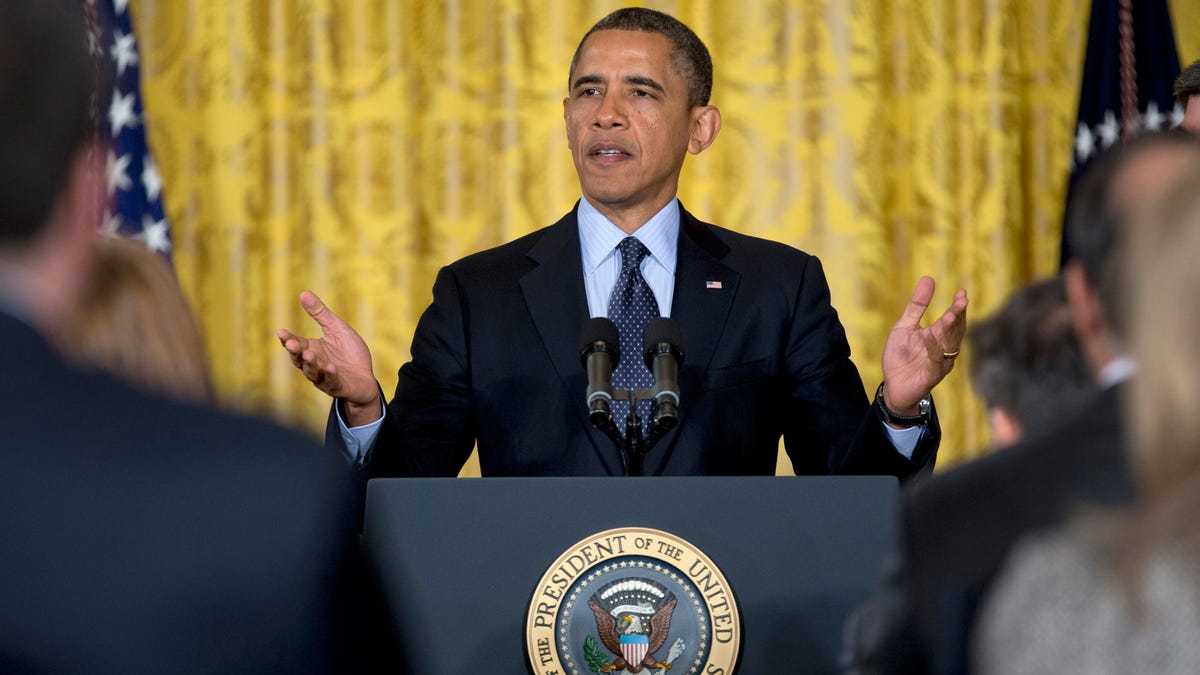
President Barack Obama gestures to the audience as he arrives in the East Room of the White House in Washington, Friday, Jan. 25, 2013, to announce that he will name current Deputy National Security Adviser Denis McDonough as his next chief of staff. (AP Photo/Carolyn Kaster) (AP)
In January, a unanimous Court of Appeals for the DC Circuit held that the president violated the Constitution by making "recess appointments" when the Senate was not, in fact, in recess.
If you think this is just another one of those dry, lawyerly technicalities, think again. One of the Constitution’s essential checks and balances is the requirement of Senate "advice and consent" for presidential appointments. The Recess Appointments Clause of Article II provides a narrow exception to that requirement: the president can fill executive branch vacancies that occur between Congress’s official sessions.
Last year, President Obama became the first president to make “recess appointments” while the Senate was still in session when he appointed three members of the National Labor Relations Board.
[pullquote]
In trying to defend Obama’s power grab, the administration revealed its deep contempt for the rule of law. As the DC Circuit’s opinion makes clear, the administration had argued that the president should have the sole, unfettered discretion to determine when the Senate is in "recess," constitutionally speaking. Under this theory, the president could literally wait until the Senate is on a lunch break, and then quickly appoint Chuck Hagel to the Pentagon -- and nobody could second guess him. This assertion was so brazen that a shocked Court of Appeals flatly declared: "This will not do.” The president’s interpretation of the Recess Appointments Clause “would demolish the checks and balances inherent in the advice-and-consent requirement,” said the Court.
The president’s attempted end-run around the Constitution should come as no surprise to those of us who have watched the decline of the rule of law these last four years. The president’s first term began, let us recall, with an auto “bailout” that robbed Chrysler bondholders to pay off the United Auto Workers.
When the Supreme Court recognized the free speech rights of corporations in Citizens United v. FEC, Obama first resorted to public humiliation of the justices on national TV. He later prepared an executive order that sought to coerce corporations from making political contributions under pain of forfeiting government contracts. It was only when news of the pending order leaked out that the administration quietly dropped the whole thing.
Under the Constitution, the president’s primary duty in domestic affairs is to “take care that the laws be faithfully executed.” There’s no mystery about this imperative: it does no good for the People’s representatives to enact laws if the executive branch fails to implement the laws. And yet, the president has taken a pick-and-choose approach to this vital duty.
Obama did not like Bill Clinton’s Defense of Marriage Act, for example, so he declared that he wasn’t going to defend it. And he has routinely failed to enforce federal immigration laws; most egregiously in his executive order unilaterally exempting 800,000 illegal immigrants from the scope of federal law. Congress was not consulted. Why bother?
Whereas President Clinton signed landmark legislation to “end welfare as we know it,” President Obama has been exempting states from the law’s workfare requirements, even though the welfare reform law gives him no such power.
As a senator, Obama railed against George W. Bush’s anti-terror wiretapping program. As president, Obama claims the power to kill any person – even US citizens – via drone strikes without congressional authorization.
In 1780, future president John Adams wrote that separation of powers was essential to maintaining “a government of laws and not of men.” As the current Chief Executive asserts dominion over the other two branches, we are in danger of losing our government of laws.
